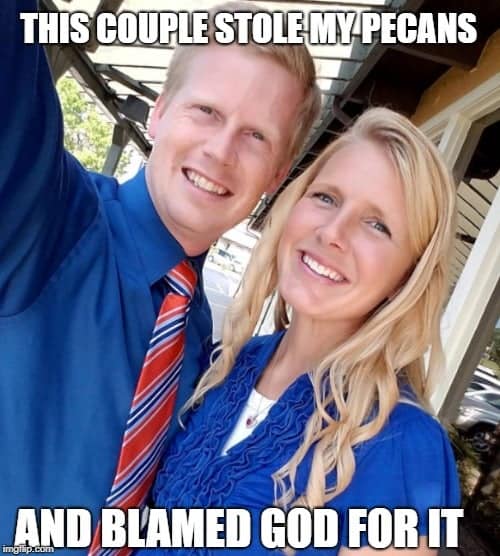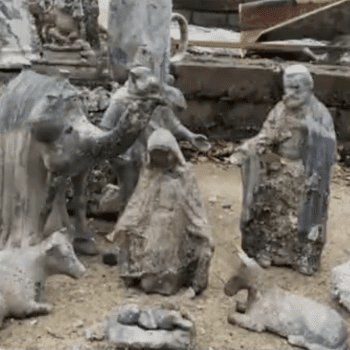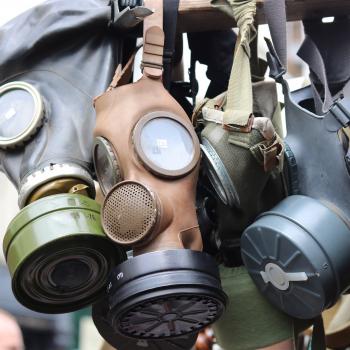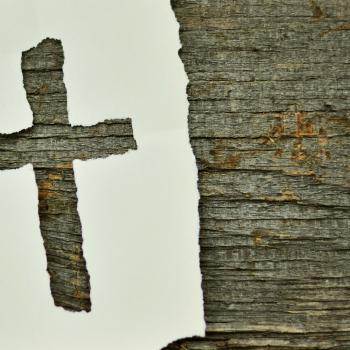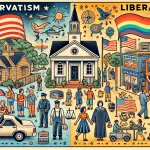I recently received the following email:
I have been reading your blog for a few months now and so much of what you write resonates with me. I didn’t grow up Quiverful or quite as fundamentalist as you did, but still very conservative Christian. We went to a megachurch in the DC area, and I was very active in the youth group. Then I studied abroad. Seeing other cultures, especially visiting Muslim countries, I realized everyone believed in their religion just as devoutly and began to think that maybe every religion was a different version of the same basic thing. Eventually, that gave way to atheism, which is where I am today. I appreciate you and your blog so much – thank you for sharing as much as you do.
The purpose of this email is really to reach out and ask you about something that has been troubling me for about 6 months now. I am having an existential crisis. How do you deal with death – mentally and emotionally?
I ignored it for the most part, but one night I was gripped with the realization that everyone will die. Obviously I knew that before, but I had not really grasped it. I have two little children so I think that makes the feeling even more raw. Ever since that night, I think about it often and it is really frightening to me. I kind of have the sensation of being in a plane that is slowly crashing. It is so morbid! I’ve talked to a few people about it, but no one really gets it – they either always thought nothing happened to us after death, or have always believed in heaven. How do you handle the reality of death – and the fact that it is permanent – after believing in the existence of God and heaven? How do you cope? I think this is something I just need to work through, and back in my Christian days, I had mentors and Bible study small groups that I could turn to with these kinds of things.
If you don’t have time for this, I understand. You are just the person that came to mind when I wondered who I would be able to talk to about this.
–Samantha
Just today my husband and I were watching a video of prominent atheist authors talking about their views, and ninety-five-year-old Diana Athill was asked how she handles the prospect of death as an atheist. Her response? “I’m never afraid to fall asleep, I don’t know why I’d be afraid of dying, it’s really not any different.” As an atheist, death is simply nonexistence. I wasn’t bothered by not existing before I existed, so why should I should I be afraid of not existing after I die? Honestly, it sounds rather peaceful.
But Samantha makes an interesting point. Like me, she grew up with the expectation of eternal life. To go from believing that you will live forever in eternal bliss to the realization that you will cease to exist after you die can be rather jarring. One thing I realized early on is that wishing I could live forever doesn’t make it so. It’s like leading your whole life believing that you’re some sort of lost princess or the heir to an obscure billionaire, and one day you’ll be “discovered” and live a life of privilege and wealth. It doesn’t matter how much you wish that were true, if it’s not true it’s not true. I see the idea of eternal life after death in the same way – it’s mere wishful thinking, and while I understand its powerful appeal (who wouldn’t want to live forever) that appeal does not make it real.
How have I handled this whiplash understanding of what will happen to me after I die? One thing I do, as mentioned above, is to remind myself that wishful thinking doesn’t make something true. Wishing you lived in a fairy tail doesn’t make it reality. And wishing for something we don’t have, and can’t have, well, that just distracts from what we do have and promises to make us discontent and unhappy. I may wish I was a billionaire, but I’m not, and spending my life wishing I was would make me overlook the economic security, prosperity, and happiness that I do have.
That all sounds rather harsh, though, doesn’t it? Saying “eternal life doesn’t exist so stop wishing it did” doesn’t fix things. But there’s a pleasant underside to this idea: I find that knowing I have but one life to live makes me want to live this life I have to the fullest. What is the point in holding grudges or focusing on small annoyances? If this is all I’ve got, I want to enjoy it while I’m here. This makes every moment I have with my husband, daughter, family, and friends especially precious and especially fraught with meaning. It makes me all the more likely to tell my husband and daughter that I love them, and to show them my love for them by overlooking the little things and focusing on the good. Weirdly, realizing this is all I have makes me a much more pleasant wife and mother than I might otherwise be, and makes me seek fulfillment in every little moment I have.
Another idea that comforts me is that of the “circle of life.” After I die my body will break down and be assimilated back into the world to become something else. This world, with its trees, oceans, and animal life, will keep going after I’m gone. It is what lasts even as our lives end. Sometimes I like to go out into nature, surrounded by trees and grass and birds, and just feel that. Compared to millions and billions of years and the diversity and ever changing nature of life, our individual lives are really very insignificant. But we aren’t just individuals, we are part of something bigger – an ecosystem, a world, a universe – the circle of life. And to me, that feels empowering.
Samantha mentioned her two young children. I understand that. I would hate to think of losing Sally. A friend of mine from growing up recently had a miscarriage, and she wrote on facebook that she was comforted by the fact that she will someday see her baby in heaven. If I lost Sally, I wouldn’t have that comfort. Sally would just be . . . gone. It would be the end.
I deal with this in several ways. First, I remember that after death strikes there is one person not mourning, not feeling the pain of loss, not wondering how to go on with life, and that person is the one in the coffin. If I lost Sally, I would be the one who would be sad, not Sally. I might think of everything Sally never lived to do, but this wouldn’t bother Sally. Sally would simply not exist, and would experience her nonexistence the way we do a deep dreamless sleep, just without ever waking up. Sally wouldn’t mind being dead, because she wouldn’t be. It would be I who would mind Sally being dead. If I were to lose Sally, I’d like to think that that understanding – that Sally was suffering no pain or regret – would comfort me.
Next, I try to make Sally’s every moment here on this earth pleasant and worthwhile, knowing that she, like I, has but one life. If I ever were to lose her, I wouldn’t want anything to regret. This helps me to be especially kind to her, especially involved in playing with her, and especially grateful for every moment I have with her. After all, if I did ever lose Sally, all I would have is the memories of our life together, and I’d like those memories to be pleasant and without regret.
Finally, I remember what I said earlier about the circle of life. Death is simply a part of life, no matter how much we may wish it wasn’t. People die, people are born, and life goes on. Sally is just a part of that larger cycle, and that is something I have to accept.
But the fear we feel of death, or of losing someone we love, often isn’t something that can be reasoned with. It’s not necessarily a rational thing, it’s a gut-level emotional thing. And so, Samantha, realize that what I’ve said here is simply how I try to understand and rationalize death. It may help your “existential crisis,” and it may not. Sharing my thoughts is all I can do.
One thing that makes this sort of thing especially difficult for people like you and I is that, like I said before, we were raised to believe we would live forever. If we’d never been told those things, accepting that life is limited and will end would almost certainly be easier. It’s sort of like the moment a child realizes Santa isn’t real, except that the idea of eternal life is a whole not bigger than Santa. But just as in that case, holding onto the idea of Santa won’t do any good. We have to grow up, accept reality, and move on. But saying that is easier than doing it.
I’d like to finish by offering some links with other atheists’ points of view, and also by soliciting my atheist readers to offer their own suggestions and their own answers to Samantha’s question.
How Atheists Deal with Death and Loss





